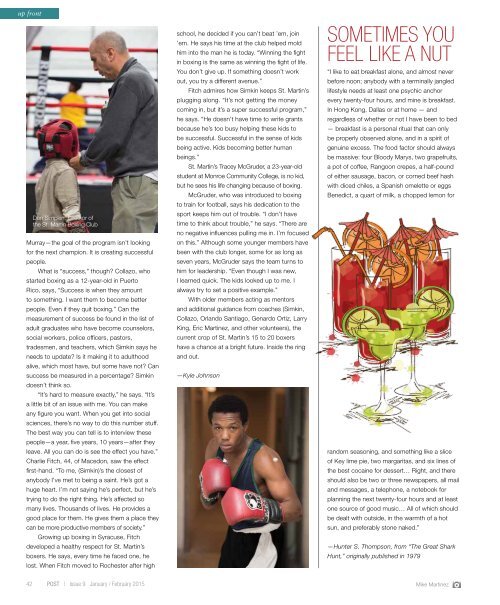You also want an ePaper? Increase the reach of your titles
YUMPU automatically turns print PDFs into web optimized ePapers that Google loves.
up front<br />
Don Simpkin, Director of<br />
the St. Martin Boxing Club<br />
Murray—the goal of the program isn’t looking<br />
for the next champion. It is creating successful<br />
people.<br />
What is “success,” though? Collazo, who<br />
started boxing as a 12-year-old in Puerto<br />
Rico, says, “Success is when they amount<br />
to something. I want them to become better<br />
people. Even if they quit boxing.” Can the<br />
measurement of success be found in the list of<br />
adult graduates who have become counselors,<br />
social workers, police officers, pastors,<br />
tradesmen, and teachers, which Simkin says he<br />
needs to update? Is it making it to adulthood<br />
alive, which most have, but some have not? Can<br />
success be measured in a percentage? Simkin<br />
doesn’t think so.<br />
“It’s hard to measure exactly,” he says. “It’s<br />
a little bit of an issue with me. You can make<br />
any figure you want. When you get into social<br />
sciences, there’s no way to do this number stuff.<br />
The best way you can tell is to interview these<br />
people—a year, five years, 10 years—after they<br />
leave. All you can do is see the effect you have.”<br />
Charlie Fitch, 44, of Macedon, saw the effect<br />
first-hand. “To me, (Simkin)’s the closest of<br />
anybody I’ve met to being a saint. He’s got a<br />
huge heart. I’m not saying he’s perfect, but he’s<br />
trying to do the right thing. He’s affected so<br />
many lives. Thousands of lives. He provides a<br />
good place for them. He gives them a place they<br />
can be more productive members of society.”<br />
Growing up boxing in Syracuse, Fitch<br />
developed a healthy respect for St. Martin’s<br />
boxers. He says, every time he faced one, he<br />
lost. When Fitch moved to Rochester after high<br />
school, he decided if you can’t beat ’em, join<br />
’em. He says his time at the club helped mold<br />
him into the man he is today. “Winning the fight<br />
in boxing is the same as winning the fight of life.<br />
You don’t give up. If something doesn’t work<br />
out, you try a different avenue.”<br />
Fitch admires how Simkin keeps St. Martin’s<br />
plugging along. “It’s not getting the money<br />
coming in, but it’s a super successful program,”<br />
he says. “He doesn’t have time to write grants<br />
because he’s too busy helping these kids to<br />
be successful. Successful in the sense of kids<br />
being active. Kids becoming better human<br />
beings.”<br />
St. Martin’s Tracey McGruder, a 23-year-old<br />
student at Monroe Community College, is no kid,<br />
but he sees his life changing because of boxing.<br />
McGruder, who was introduced to boxing<br />
to train for football, says his dedication to the<br />
sport keeps him out of trouble. “I don’t have<br />
time to think about trouble,” he says. “There are<br />
no negative influences pulling me in. I’m focused<br />
on this.” Although some younger members have<br />
been with the club longer, some for as long as<br />
seven years, McGruder says the team turns to<br />
him for leadership. “Even though I was new,<br />
I learned quick. The kids looked up to me. I<br />
always try to set a positive example.”<br />
With older members acting as mentors<br />
and additional guidance from coaches (Simkin,<br />
Collazo, Orlando Santiago, Genardo Ortiz, Larry<br />
King, Eric Martinez, and other volunteers), the<br />
current crop of St. Martin’s 15 to 20 boxers<br />
have a chance at a bright future. Inside the ring<br />
and out.<br />
—Kyle Johnson<br />
Sometimes You<br />
Feel Like a Nut<br />
“I like to eat breakfast alone, and almost never<br />
before noon; anybody with a terminally jangled<br />
lifestyle needs at least one psychic anchor<br />
every twenty-four hours, and mine is breakfast.<br />
In Hong Kong, Dallas or at home — and<br />
regardless of whether or not I have been to bed<br />
— breakfast is a personal ritual that can only<br />
be properly observed alone, and in a spirit of<br />
genuine excess. The food factor should always<br />
be massive: four Bloody Marys, two grapefruits,<br />
a pot of coffee, Rangoon crepes, a half-pound<br />
of either sausage, bacon, or corned beef hash<br />
with diced chiles, a Spanish omelette or eggs<br />
Benedict, a quart of milk, a chopped lemon for<br />
random seasoning, and something like a slice<br />
of Key lime pie, two margaritas, and six lines of<br />
the best cocaine for dessert… Right, and there<br />
should also be two or three newspapers, all mail<br />
and messages, a telephone, a notebook for<br />
planning the next twenty-four hours and at least<br />
one source of good music… All of which should<br />
be dealt with outside, in the warmth of a hot<br />
sun, and preferably stone naked.”<br />
—Hunter S. Thompson, from “The Great Shark<br />
Hunt,” originally published in 1979<br />
42 <strong>POST</strong> | Issue 9 <strong>January</strong> / <strong>February</strong> <strong>2015</strong><br />
Mike Martinez


